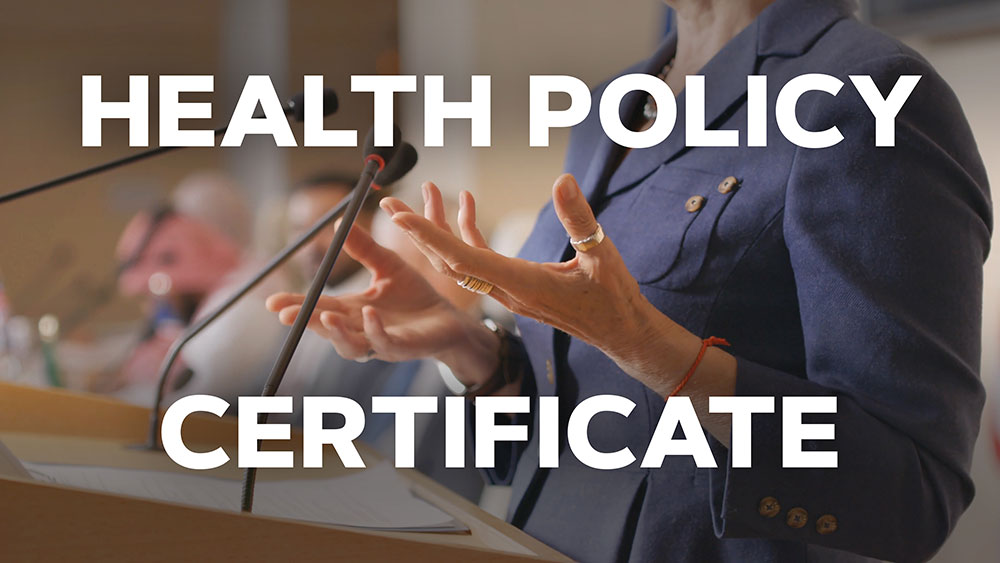You are invited to attend a virtual, synchronous information session about JMU's Health Policy Certificate program.
Introduction
The Health Policy certificate (HPC) is an interdisciplinary, flexible, cost-effective option that allows individuals who already have a bachelor’s degree to enhance their knowledge and skills in health policy development, advocacy and analysis. The certificate is offered in a flexible format, offering online and hybrid completion options.
Health Policy certificate graduates are prepared to
- Influence health policy in local, state, national and international arenas.
- Work with congressional offices, boards, and policy divisions of state, national and international health care associations (public-private and not-for-profit sectors).
- Further their graduate study or research in healthcare, health policy, public health and related fields.
Request Information - email Dr. Jeannie Corey
Application Requirements:
- Confirmed Bachelors Degree
- GPA of at least 2.5
- Completion of JMU Graduate School Application including a brief essay describing how this certificate supports the applicants’ interests and future impact in healthcare.
Health Policy Certificate FAQs
JMU offers robust health professions and government-related graduate programs. Healthcare policy decisions made at both the federal and state levels directly impact professional practice, client care, and population health. The Health Policy Certificate (HPC) prepares graduates to become healthcare advocacy leaders and government-related advocates. The purpose and expected student outcomes of the Health Policy Certificate align with JMU’s vision: “To be the national model for the engaged university: engaged with ideas and the world.” Students who complete the HPC will be equipped with the knowledge and skills to serve their communities and organizations as they advocate for local, state, and national policy change. With only two other Health Policy Certificate Programs in Virginia, one in Southwest Virginia and one in Northern Virginia, James Madison University offers the only Health Policy Certificate in the western part of the state.
Historically, nurses, physicians, and other health professionals have exhibited lackluster enthusiasm and understanding regarding the political health policymaking process. Multiple studies indicate barriers to participation including poor enthusiasm, time constraints and frustration with the political process, while shared benefits included addressing health issues and improving population health (Boswell, Cannon, & Miller, 2005: Salvador, 2010; Thompson et al., 2009; Primomo &Bjorling, 2013; Eaton et al., 2017). Evidence demonstrates the need to strengthen educational opportunities in this area.
“Employment of healthcare occupations is projected to grow 14 percent from 2018 to 2028, much faster than the average for all occupations, adding about 1.9 million new jobs. Healthcare occupations are projected to add more jobs than any of the other occupational groups. This projected growth is mainly due to an aging population, leading to greater demand for healthcare services. Employment of management occupations is projected to grow 7 percent from 2018 to 2028, faster than the average for all occupations, which will result in about 706,900 new jobs” (Bureau of Labor, 2020). Employment growth is expected to be driven by the formation of new organizations and expansion of existing ones, which should require more workers to manage these operations. With a direct impact on practice, health care professionals and health care managers will benefit from basic knowledge and skills in health policy advocacy.
Please refer to the JMU Graduate Catalog for curricular requirements.
Our Faculty
Jeannie S. Corey, DNP, RN, NEA-BC
Program Coordinator
Professor- School of Nursing
Holly Buchanan, DNP, ANP-BC
Associate Professor- School of Nursing
Melody Eaton, PhD, RN, FAAN
Director and Professor- School of Nursing
Zachary Gouchenour, Ph.D.
Lecturer, Economics
Kristy Liskey, MPAS, BS
Associate Professor and Director of Clinical Education-Physician Assistant Program
Tobias Reynolds-Tylus PhD
Associate Professor - School of Communication Studies
Sharlene Richards, PhD
Professor - School of Communication Studies
Donna L. Schminkey, PhD, MPH, MSN, CNM, RN
Associate Professor - School of Nursing



